‘Just do it!’ say UU academics making podcasts
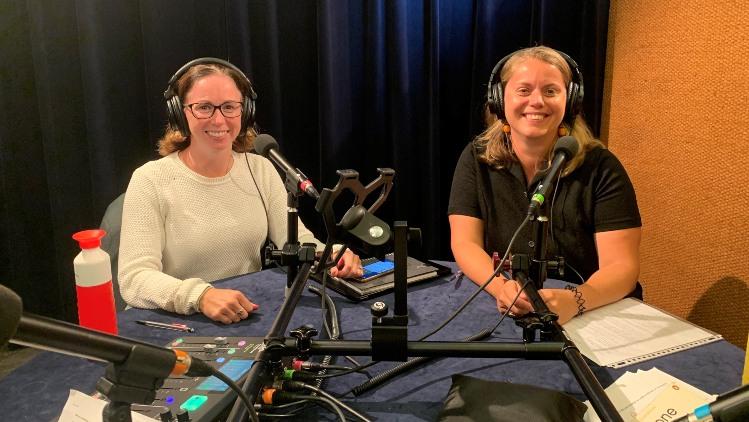
Although podcasts aren’t anything new (the term was coined in 2004), it looks like the medium is coming into fashion. Thanks to free audio producing software, streaming services like Spotify, and dedicated platforms like Stitcher, it is now easier than ever to make, find, and listen to podcasts.
2020 was the year of the podcast: listenership doubled on Spotify alone, with 21 percent of its 299 million listeners now using the app for podcasts. Willem Janssen, Assistant Professor at the School of Law and host of Bestek, a podcast on public procurement (in Dutch, with English episodes since May), thinks that the pandemic is having a “massive” impact on the podcasting landscape. “Since March, my audience has doubled and I’ve heard similar things from other podcasters”.
"I often heard: 'But you're an academic. Why are you even doing that?'"
Janssen is part of a growing number of academics using podcasts to reach a broader audience or to discuss ideas with their peers. According to this study, the number of English-language science podcasts grew from around 200 in 2010 to 952 in 2018. There are no such numbers about the Netherlands, but podcasting in general is on the rise here as well, so much so that the Dutch Podcast Awards were created in 2018. Education was the fifth most popular subject on Spotify in 2020, which, according to the Swedish streaming platform, shows that many people use podcasts not only for entertainment purposes but also as a learning tool.
Even so, some people have a hard time understanding why a scholar would want to venture into podcasting. Janssen: “When I started in January 2019, I often had to explain what a podcast was and I heard: ‘but you’re an academic. Why are you even doing that?”
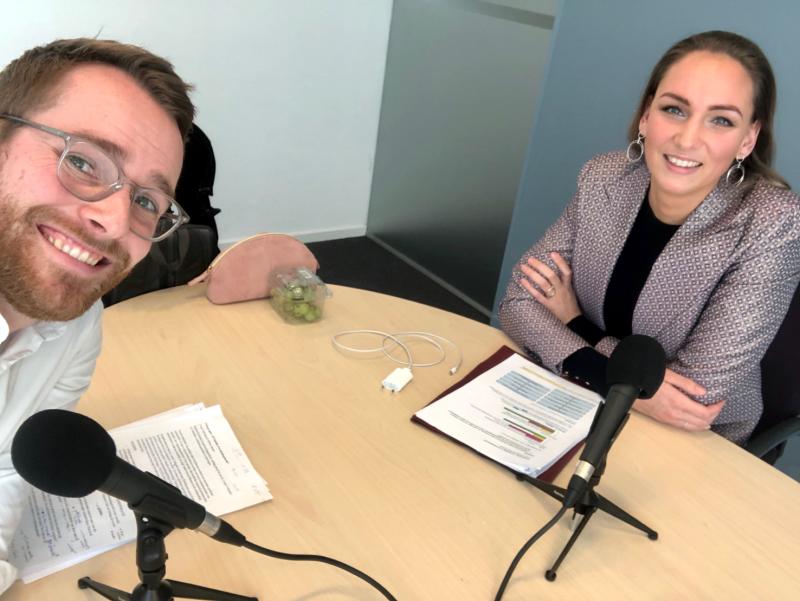
Willem Janssen recording one of the episodes of Bestek alongside Louise Verboeket (Maastricht University). Photo: personal archive
When Vincent Crone, Associate Professor of Media Studies at the Faculty of Humanities, started the podcast Onder Mediadoctoren (in Dutch) in 2012 alongside social scientist Linda Duits, the waters were so uncharted that even they didn’t know what they were doing. They basically made a radio show and distributed it as a podcast. “Even our tone of voice resembled that of a radio host”, Crone laughs. “We were so insecure and scared”, Duits admits.
Little by little, they got the hang of it and adopted Onder Mediadoctoren’s current format, which consists of informal conversations with academics researching topics the duo is interested in. The length of the episodes has grown considerably, too: Crone and Duits used to follow the radio standard of keeping segments short, but podcast fans don’t mind listening to long conversations, as long as they’re interesting. Each episode of Onder Mediadoctoren now lasts about 1.5 hours and gathers around 2,000 listeners.
Demystifying the scientist
Crone and Duits’ main goal is to do science communication with a human side. “Podcasts emulate the intimate conversations you have with your friends”, explains Crone. “You can make mistakes and be transparent about them. Communication officers at the university push you to leave out all the doubts and make it look like you’re 100 percent certain.”
“Sometimes you feel like you’re the only one going through something and talking to others helps you to realise that’s normal”, says PhD candidate Jip Leendertse, one of the three voices of Copernicast, a podcast about the day-to-day experiences of a young researcher (in Dutch, with one episode in English so far). Episodes cover topics like work pressure and expectations of success.
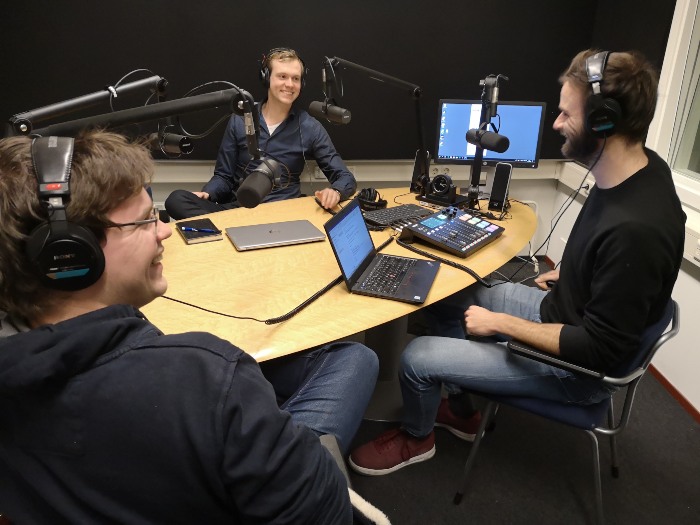
Copernicast hosts Jip Leendertse (centre), Jaap van Slageren and Timon de Boer. Photo: personal archive.
The three young researchers decided to start a podcast because they felt that a lot is said about research and teaching, but no one prepares you for the societal aspects of pursuing a PhD. “Besides sharing experiences with other PhD candidates, we want to communicate with students considering an academic career, to show them what it’s actually like. I think being open about our struggles is one of the biggest strengths of our podcast.”
DOMCast, the award-winning project in which twelve UU students, guided by Professor of Digital History Pim Huijnen, investigate themes related to Utrecht’s history, is another example of a podcast demystifying the image of the utterly serious, all-knowing scientist. Delving into topics suggested by Utrecht's residents, the students (eleven Dutch-speaking and one English-speaking) took the audience along the research process, sharing not only the results, but the bumps in the road as well.
“One of our goals was to show the public what History researchers do”, Huijnen recalls. “Historians are used to building a narrative based on what they do know, not what they don’t know. Some of my students had a hard time sharing their investigation instead of a round story. One of them came to me almost panicking, saying: ‘we’re at a dead end! I can’t get any further! What do I do with the next episode?’. I replied: ‘That’s brilliant! Let’s talk about that!’”
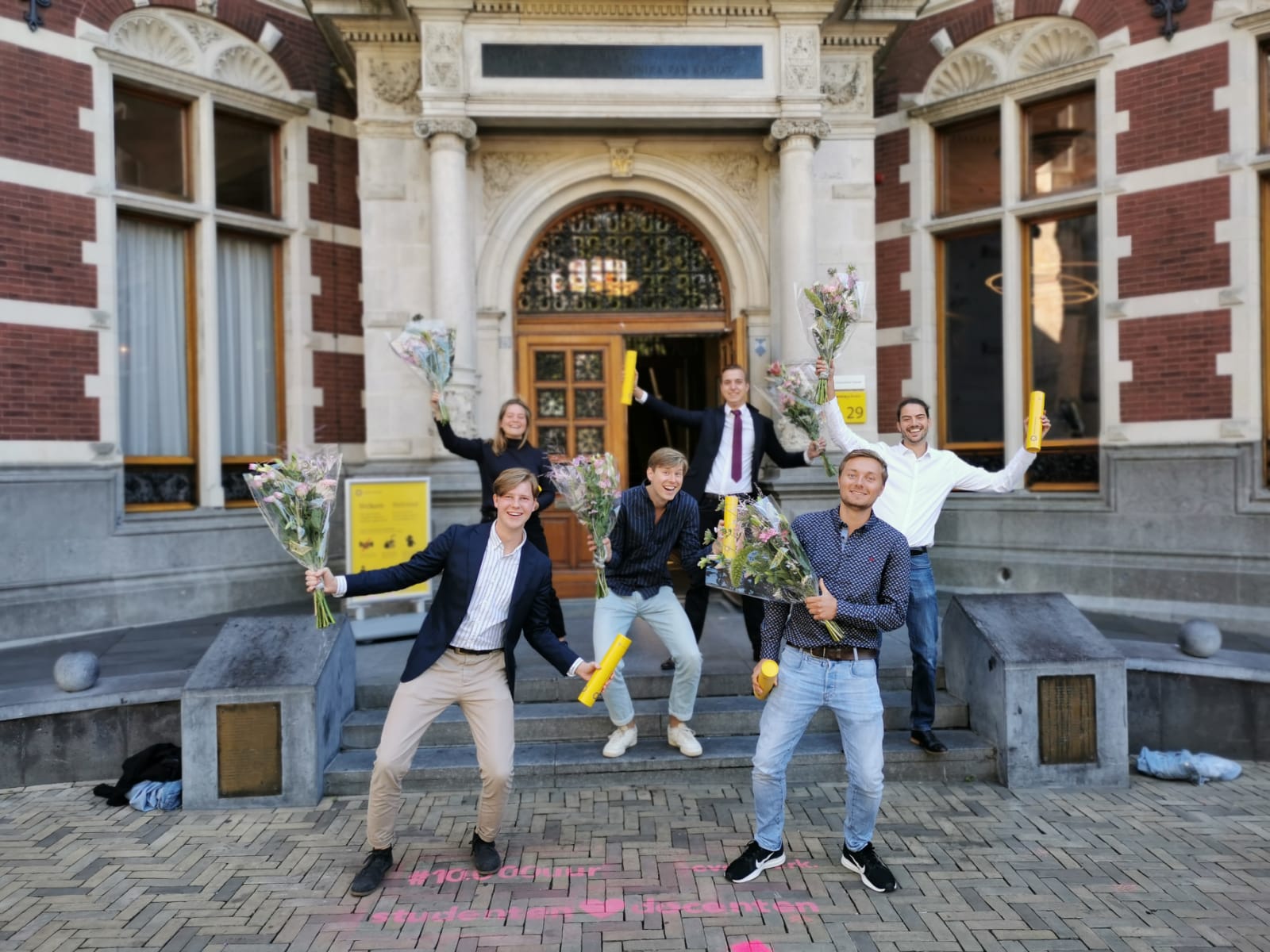
The students involved with DOMCast, after winning the Exceptional Extracurricular Achievement award on last year's Student Awards. Photo: DOMCast website
Tessa Diphoorn, Assistant Professor at the Department of Cultural Anthropology, and Brianne McGonigle Leyh, Associate Professor at the School of Law (pictured above this article), are amused when the guests of their podcast, Travelling Concepts on Air, come to the studio carrying a pile of books and notes, only to realise they didn’t need any of that by the end of the recording. “We told you! It’s just a conversation!”
Travelling Concepts approaches interdisciplinarity by inviting academics from different fields to talk informally (in English) about concepts that have “travelled” across disciplines, such as war, time, and sustainability.
Janssen from Bestek observes that podcasting requires academics to show a certain vulnerability. “When I write an article, my words are carefully chosen, I can double check every comma, whereas if I’m just talking to you, I can say ‘I don’t know’”.
“Academics can be hesitant to make mistakes publicly, but they shouldn’t be”, states Crone. Scary as they may be, those informal discussions can be fun. “A few weeks ago, we had a technical hiccup and couldn’t record the whole show. But I still had a great time”.
Academic value
Podcasts can also inform further research. “Students use our podcast as a source for writing their thesis”, celebrates Duits. Diphoorn and McGonigle Leyh intend to use their podcast for teaching purposes in the future, something that the young researchers of Copernicast are already trying out: they have replaced all lectures in a course with podcasts. “Students absolutely loved it so we’ll be using them again next year!” Leendertse gushes. Janssen is conducting a similar experiment: he’s investigating how useful podcasts can be as part of the syllabus or as an exam format.
“There’s a much bigger audience out there than you think”
Finally, the response can be extremely rewarding. All scholars interviewed for this article remarked that they didn’t expect so many people to be interested in their field of study. “The audience turned out to be much broader. That was an eye-opener for me”, says Janssen.
“There’s a much bigger audience out there than you think”, stresses Peter Kuipers Munneke, researcher at the Institute for Marine and Atmospheric Research. His statement comes as a surprise, given he’s the weatherman on NOS, the Dutch public broadcasting service, since 2013. Two years ago, he started De Weerman, a podcast (in Dutch) about meteorological phenomena. Each episode is listened by 10,000 people on average. “There’s a niche for everything”, he concludes.
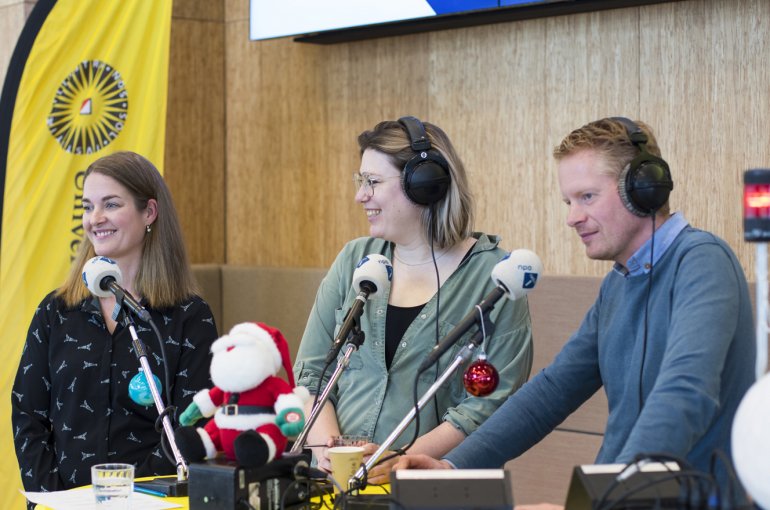
Kuipers Munneke recording De Weerman's 2019 Christmas special at UU's Koningsbergergebouw
Not for everyone
Just because everybody seems to be jumping on the bandwagon, doesn’t mean you should be. The interviewees were unanimous about podcasting not being for everyone. Janssen and Crone both noticed that a lot of projects die down quickly because people underestimate how hard it is to make a podcast.
“You have to think about the structure, how to keep the audience engaged, what topics to talk about… And that’s just content, I’m not even mentioning the technical side of it: the recording, the editing, the jingle, and so on”, explains Janssen. All that on top of an already busy schedule of researching and teaching.
If you plan on having guests on your podcast, that can be pretty time consuming as well. Diphoorn and McGonigle Leyh report that coordinating the schedules of four busy academics has been the most challenging part of their work so far.
"The easier you want to make it, the longer it takes"
If your podcast aims to reach a non-academic audience, then you have to get rid of the jargon or at least explain it – and that takes time, too. “A lot of work goes into making the message easy to understand. My rule of thumb is: the easier you want to make it, the longer it takes”, says Kuipers Munneke from De Weerman.
Besides, podcasts might not even be the best way to reach your target audience at all. “Only podcast listeners listen to podcasts. Either you love them and listen to many titles, or you don’t listen to them at all”, Duits elucidates. Sometimes academics are better off writing a column, making a YouTube video, or tweeting.
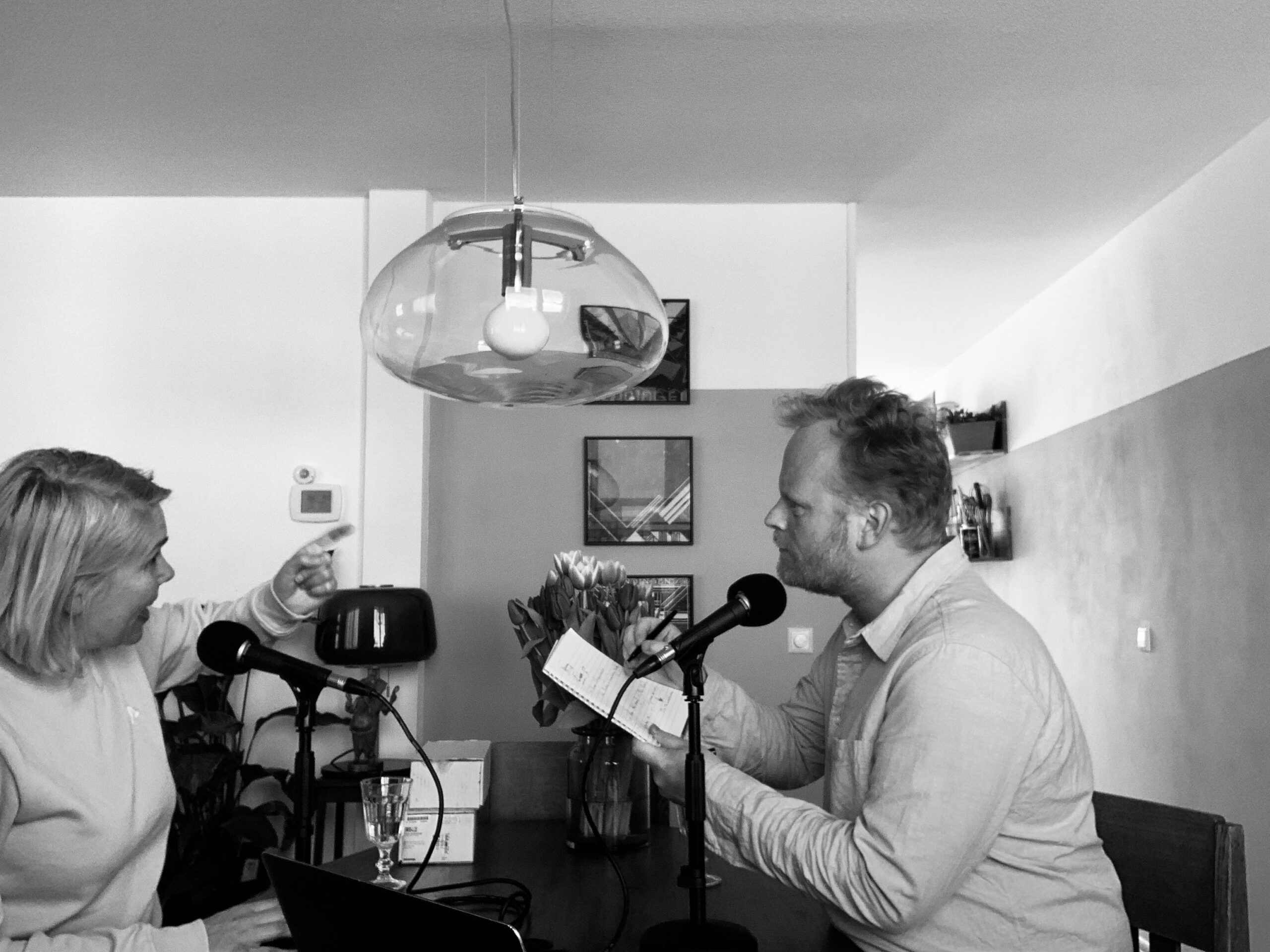
Linda Duits and Vincent Crone recording an episode of Onder Mediadoctoren
Passion project
Not everyone is lucky to be backed by the NOS like Kuipers Munneke is. Academic podcasts are usually a passion project, although the interviewees find that universities and financiers are becoming more open to funding this type of endeavour. The young researchers of Copernicast are a good example. They were able to secure funding from the Copernicus Institute of Sustainable Development after their supervisors listened to the pilot. “They really liked our idea, so they’re covering our costs”, says Leendertse.
But their costs aren’t high anyway: 100 euros yearly, as they do almost everything themselves – something academics further down the road simply cannot do. Diphoorn and McGonigle Leyh, who met each other through the Utrecht Young Academy, dreamed about making a podcast for years, but the idea could only take off once they managed to obtain funding within the Contesting Governance Research Platform. Their podcast costs a few thousand euros a year, which covers hosting, editing and sound producing.
"If you have a podcast, is that just as good as an article in an international journal?”
Duits and Crone from Onder Mediadoctoren consider their podcast a hobby, which is why they started out paying everything from their pockets. Now they have three funding sources: a sponsor, a crowdfunding platform, and a Paypal account for donations. They’re able to break even, but their own hourly fee is not included in the calculation.
Crone considers that his salary covers the compensation for the podcast. “It’s part of my job to reach out about my research field”, he says. “Yeah, but you don’t get hours for it”, replies Linda. “Not specifically, but in my yearly review I always mention the podcast”. Linda asks if he thinks the UU should be paying him for those hours – about twelve a month. “I think they should be counted as research output.” As for Linda, although she’s never made money with the podcast, she’s sometimes invited to give paid lectures because of it.
“There’s a big trend in the university in terms of recognition and rewards. If you have a successful podcast, is that just as good as a double-lined, peer-reviewed article in an international journal? I don’t know. I think podcasts are academic output, but the question is: what are they, then? It doesn’t really fit the mold”, wonders Janssen.
So you want to make a podcast?
As a UU scholar, you’re in luck. The university has two recording studios: one at the Utrecht Science Park and another one at the Faculty of Humanities in the city centre. The latter accommodates four people, but more guests can participate via telephone. Audiovisual Engineer Hans Schuurman, who’s in charge of the studio, assures that the equipment is “very user friendly: just press record and there you go”.
Prefer to record it at home? Schuurman advises to invest in a “decent” microphone, which will cost you around 100 euros. Be sure to do it in a quiet room because “once the background noise is there, you can’t get rid of it”.
A few more tips from UUers:
- Just do it! There’s no harm in trying. “If you don’t like it, just throw it away”, says Leendertse. But don’t be a perfectionist: “you’ll learn as you go”, Diphoorn reminds. If you don’t know where to begin, the university has recently held a webinar about podcasting in science featuring Janssen and Crone, among others. If you’re not ready to have your own podcast yet, then you can record just one episode and share it on UU’s Spotify profile.
- Have a clear structure. Having a clear structure makes planning, scripting, and editing easier, not to mention listeners tend to be more loyal if they know what to expect. Kuipers Munneke from De Weerman recommends coming up with a project with a definite number of episodes. “Then it's manageable. If you like it, you can produce a second season. If not, at least you have a finished product.” As for the structure of each episode, remember that a long piece of audio isn’t a podcast.
- Don’t let the numbers get to you. Don’t get discouraged by the amount of listeners at first. Building an audience takes time. Crone: “The average amount of readers for a scientific article is nine or ten. If you think that that’s more serious than reaching five times as many people with a podcast, then you have to think about what the f**k you’re doing”. Mic drop.